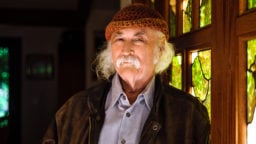MBW Reacts is a series of analytical commentaries from Music Business Worldwide written in response to major recent entertainment events or news stories. Only MBW+ subscribers have unlimited access to these articles. The below article originally appeared within Tim Ingham’s latest MBW+ Review email, issued exclusively to MBW+ subscribers.
Last week, to round out the year, I plumped for a Holiday-flavored, 48-hour trip to New York City.
I saw a bunch of cool and thought-provoking people. I put the world to rights with Brad Navin, turned up Hey Now! with Stu Bergen, and fanboy’d over Bo Burnham with Tyler Arnold and Avery Lipman.
I debated (the death of) mono-culture with Justin Kalifowitz, shared a hug with Carianne Marshall… and talked Adele and Amy with Kirk Sommer.
But perhaps the most intriguing moment came when Mark Beaven recommended me shrimp pasta… via the phone of Warner Music Group boss, Robert Kyncl.
I join Kyncl for dinner at one of his favorite haunts – Central Park institution, Marea – where he occasionally dines with Beaven, one of the most influential songwriter managers in the game.
The duo’s friendship is keenly apparent (“I buy the food, he brings the wine,” grins Kyncl). Yet it’s interesting that the Warner exec – one of those, big, bad major label bosses, after all – regularly seeks the counsel of a professional champion of songwriters.
This isn’t all that’s unusual about Kyncl’s view of the world.
When I inform one of Kyncl’s contemporaries that I’m sitting down with him, they cheekily reply: “Good luck getting a word in edgeways!!”
I come prepared.
I ask Kyncl – who spent his first 21 years in then-Communist-controlled Czechoslovakia and still remembers the Russian anthem – whether, in the modern era of rampant misinformation, he remains a free speech absolutist. (On balance, it’s a no; Kyncl learned the downside during his years at YouTube of giving “guys in Arby’s” the same level of algorithmic reach as credible creators.)
I also ask Kyncl where his desire to ‘win’ in business originated. Once again, he points to his upbringing.
In fourth grade, he participated in a highly competitive cross-country ski team, funded by the national government. He then moved on to a middle school that only accepted athletes as students, before joining a boarding school at which he was expected to train two to three times each day. “It was ultra-competitive,” he says – a “hardcore” environment where winning was “everything”.
“the topic we debate most over our near-three hours together is obvious: What will a major music company look like in the future… and will artists still care?”
Obviously, I ask him about books, films, and music. He’s no great fan of fiction, but speaks in glowing terms about Red Notice, a thrill-ride exposé of real high-finance corruption from Bill Browder.
And I ask him who he contacted for advice when Len Blavatnik offered him the Warner Music Group job in 2022. Names included media mogul Jeffrey Katzenberg, Snap Inc. Chairman Michael Lynton, former HBO boss Richard Plepler, and ultimately his longtime YouTube colleague, the late Susan Wojcicki.
Yet the topic we debate most over our near-three hours together is a more obvious one: What will a major music company look like in the future… and will artists still care?
Kyncl’s history in media – seven years at Neflix (2003-2010) and 12 years at YouTube (2010-2022) – has suffused within him the belief that digital platforms are the Godzillas of the entertainment business.
Yet he also believes that, without large-scale aggregators of quality content (i.e. ‘majors’) negotiating with FAANG and Spotify, the value of copyright risks erosion. As he puts it: “For those artists going it alone, it’s you vs. a $100 billion platform or even a trillion-dollar platform; you don’t stand a chance.”
There’s probably a reason Kyncl subconsciously picks this $100 billion figure; it’s the market cap that Spotify reaches shortly before we sit down to dinner. It’s also roughly the same assumed value of all three major music companies combined.
Kyncl doesn’t take issue with Spotify’s boundless market cap growth. He’s much more focused on Warner extracting fair value from the platform… and ensuring that Daniel Ek‘s company is constantly being challenged by a strong No.2 (currently: YouTube Music).
Kyncl reasons that realtors can be confident of getting a good price for a property so long as they have at least two people keen to buy it. (In this analogy, Warner Music Group’s catalog is the house, the streaming services are the buyer, and Kyncl’s licensing team is the realtor.)
Kyncl has overseen some dramatic change at Warner Music Group since becoming CEO in January 2023.
This year, WMG’s efficiency drive has led to 750 redundancies. About half of those lay-offs came in WMG’s now-jettisoned ‘owned and operated media’ divisions, yet WMG veterans central to music rights (including Max Lousada and Julie Greenwald) have also exited.
Today, Warner’s global headcount stands at around 5,500 people vs. approximately 10,000 at Universal. I suggest to Kyncl that, in future, artists may simply be drawn to the ‘major’ with the most global offices and the most employees (‘boots on the ground’). He disagrees.
Instead, he argues that sheer volume of headcount doesn’t equate to a company’s global impact – or its speed to market. “Velocity” is a word he uses a lot.
“Kyncl insists that Warner is generally less interested than its competitors in signing low-margin deals with superstars.”
The majority of the funds Kyncl has freed up with those redundancies, he’s reinvesting. Back in January, one of his key promises for 2024 was to expand Warner’s A&R pipeline; last month, there was a blink-and-you’d-miss-it-stat on WMG’s earnings call: “A&R investment is up approximately 11% [YoY, across Warner’s latest FY]”.
Kyncl further insists that Warner is generally less interested than its competitors in signing low-margin deals with superstars.
He says that WMG now strategically avoids “empty calories” deals, i.e. agreements that see a company book large revenues but a meager morsel of profit. “We’re more disciplined than that; we’re focused on value and reinvestment,” he says.
Kyncl claims that Warner’s global distribution agreement with BMG was one such low-margin/”empty calories” deal for WMG, and that he didn’t shed tears when both sides agreed to end it. I infer from our chat that similar margin concerns have informed WMG ultimately not acquiring for-sale services businesses such as Believe and Downtown Music.
Kyncl then turns the tables with his own zinger: “Can you name one major analog media company that has ever completed a truly successful digital transformation?”
I falter. He says: “Warner Music Group could be the first.”
Kyncl’s rationale: in the analog era, the record business was simple – ”basically radio and physical retail”. Music companies, on the other hand, were structurally complex, selling LPs and CDs on a country-by-country basis.
Today, according to Kyncl, that situation has reversed. The record business is complex and fractured but Warner is striving for structural simplicity – a “business without borders”. He believes this will enable its artists and employees to “move at velocity”. (There’s that word again.)
In a year where Warner had big hits with new artists like Benson Boone and established stars like Charli xcx, Kyncl believes WMG’s flatter structure enables artists to go global, faster.
He reveals that Warner recently “fully globalized” its catalog division under Kevin Gore. The twist: Kyncl doesn’t define catalog as music that’s 10 years or older, but simply “artists who no longer make new music”.
Thus, everything from Aretha Franklin to Fleetwood Mac lives with Gore’s catalog team, but active artists like Linkin Park have their entire body of work promoted by the same ‘frontline’ record company that’s handling their new album.
According to Kyncl, Warner Music Group is now around halfway through its digital transformation, across data, systems, and organizational structure.
Other companies – mainly outside music – he argues, “misunderstand” how a truly digital-first media firm operates. (Someone who does understand, in Kyncl’s mind, is Elliot Grainge, the new head of Atlantic Music Group. Drinks had flowed by this point, but I remember Kyncl saying that he and Grainge “think about the world in a similar way” and share a thirst for “disruption”.)
Shortly before we leave, Kyncl delivers a memorable soundbite on the value of music; one that may be designed to remind his listener that, beyond his belief in the power of tech, he also appreciates the magic of ‘content’.
“Art decorates walls,” he says. “Music decorates time.”
Twenty-four hours later, I kind of get what he means.
I’m at Gramercy Theater, watching a jaw-dropping show from alt-country marvel, Stephen Wilson Jr. It’s the fourth time I’ve seen the Big Loud artist this year – and the best.
He’s decorating time all over the shop.
Just as I hear a whisper that intrigued A&Rs from Republic Corps are watching on, Stephen’s manager, Alicia Jones, texts to make sure I got in okay. I reply, affirmatively, that I’m “losing my f**ing mind”.
Hopefully I’ll find it again by the close of the Holiday break. No promises.
Wishing you and yours a wonderful one. See you on the other side.Music Business Worldwide





